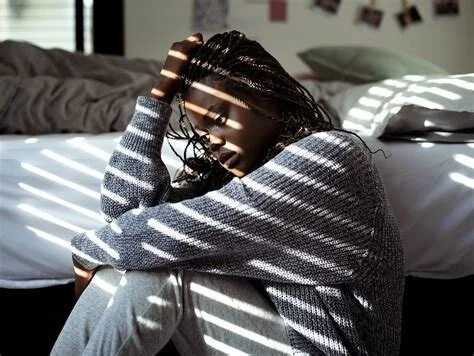It's Not You, It's The Patriarchy
Women’s History Month comes around every March with new stories, sisterhood, and solidarity. But when it comes to the history of women and trauma, history has repeated itself time and time again. Women have always been made to feel inconvenient and unworthy. Through institutions of misogyny and bigotry, women have been attacked throughout history with verbal abuse, pervasive sexual violence, and constant harassment. The struggles that women face, as well as the way that we’ve evolved to be so resilient, have taken on a wide variety of appearances over time: the Salem Witch Trials, the rise of the diagnosis of “hysteria,” the fact that heart disease is the number one killer of women primarily due to medical ignorance.
Throughout history, we as women have been taught to internalize the constant barrage of misconduct and abuse we face. We want to deny women’s trauma because if we allowed women to express their feelings or identify as trauma survivors, society would have to accept that women are - on a massive scale - being traumatized in the first place. Systems of patriarchal oppression function off of silence and ignorance that’s predicated on denying women their feelings.
Because of this normalized emotional suppression, women are plagued by pervasive stereotypes surrounding trauma, addiction, and even their physical wellbeing. Buoyed by men feeling pressure to hide their feelings entirely, women are shamed and demeaned for expressing their concerns or hurt over any given small thing - unequal distribution of household labor, lost wages, a sexist ad - let alone a trauma. This is in spite of the fact that women are uniquely at risk of experiencing trauma. Just days ago, the WHO released a global report showing that 1 in 3 women worldwide has been the victims of physical or sexual violence. This does not include how much women experience invisible abuses like financial, verbal, emotional, and psychological violence. Violence against women starts young and becomes so ingrained in society - and in the lives of women themselves - that people become numb to it, tuning it out to avoid the reckoning of women’s pain.
The resulting stereotypes about women’s trauma created by that societal emotional suppression range from flat out denial (“you’re overreacting, get over it” and “only military veterans get PTSD!”) to the more subtle “there, there” gaslighting (“you just need rest, you’re exhausted!” - as if any woman knows a time when she wasn’t exhausted) to outright hostility and blame (“you’re weak,” “you’re lying”). It is easier for us to write off the trauma of women as an individual emotional flaw, a sign of their own silly - but non-threatening - hysteria.
Despite women shouldering a disproportionate amount of trauma throughout history, the psychological field of trauma was never given mainstream legitimacy until research into “shell-shock” plunged “post-traumatic stress disorder” into the average vocabulary. When trauma had happened primarily to women beforehand, they either suffered silently or were written off as crazy, overworked, or oversensitive. But when male post-war veterans began exhibiting some of the classic signs of trauma en masse, such as nightmares, agitation, hypervigilance, and flashbacks, the disease that women had suffered from for centuries was finally taken seriously. Even as research and resources started to be devoted to trauma as a legitimate medical issue, women were blocked out of its benefits and gatekept from acknowledging their pain - which is where the enduring myth of “only military veterans get PTSD” comes from, occupying a disconnection with the reality where 10% of women will develop a clinical PTSD diagnosis in their lifetimes. Some of the most groundbreaking and revolutionary ideas we have about trauma today are because of female practitioners and experts - like Deb Dana, LCSW, whose renowned work on treating complex trauma through the neurobiological lens of the Polyvagal Theory has brought incredible opportunities for treatment and healing to the field. (You can learn more about Deb Dana’s work here) In fact, as many women who work in the mental health field have noted, these symptoms are not new and have deserved our attention for quite some time.
But even as society has made painstakingly difficult progress towards recognizing women’s trauma and working to prevent it, the inroads are slow. While more and more people have become comfortable with the idea that rape survivors - a majority of whom are women - experience “real” PTSD, the same historical gatekeeping persists on some of the most prevalent trauma women face. Through the years, in my clinical practice, I have observed a number of women whose sense of safety and reality were constantly degraded and chronically betrayed by a significant other’s sex addiction and surrounding emotional abuse. These toxic trauma bonds impact women’s bodies, their ability to properly reality test, and their ability to trust and regulate their own emotions and safety. But women facing this kind of emotional abuse have historically automatically been classified as codependent, controlling, clingy, overemotional, over the top, and unable to “just get over it.”
When women do seek help for the taxing impacts of this trauma, it has too-often not been classified as trauma at all, instead earning them misdiagnosis of depression, anxiety, and even bipolar disorder. When the trauma that women face is left undetected or unbelieved, women are left with the message that something is wrong with them - it’s their fault, not the fault of a partner in the throes of addiction or an abusive partner or a society that has been built on terrorizing women and ignoring the consequences.
But it isn’t the fault of women. It’s not you - it’s the patriarchy. This Women’s History Month, I ask every woman who has ever been the victim of trauma to allow themselves the grace to recognize their own story, acknowledge their own worth, and demand that they are not blamed for the healing that they so deserve.




